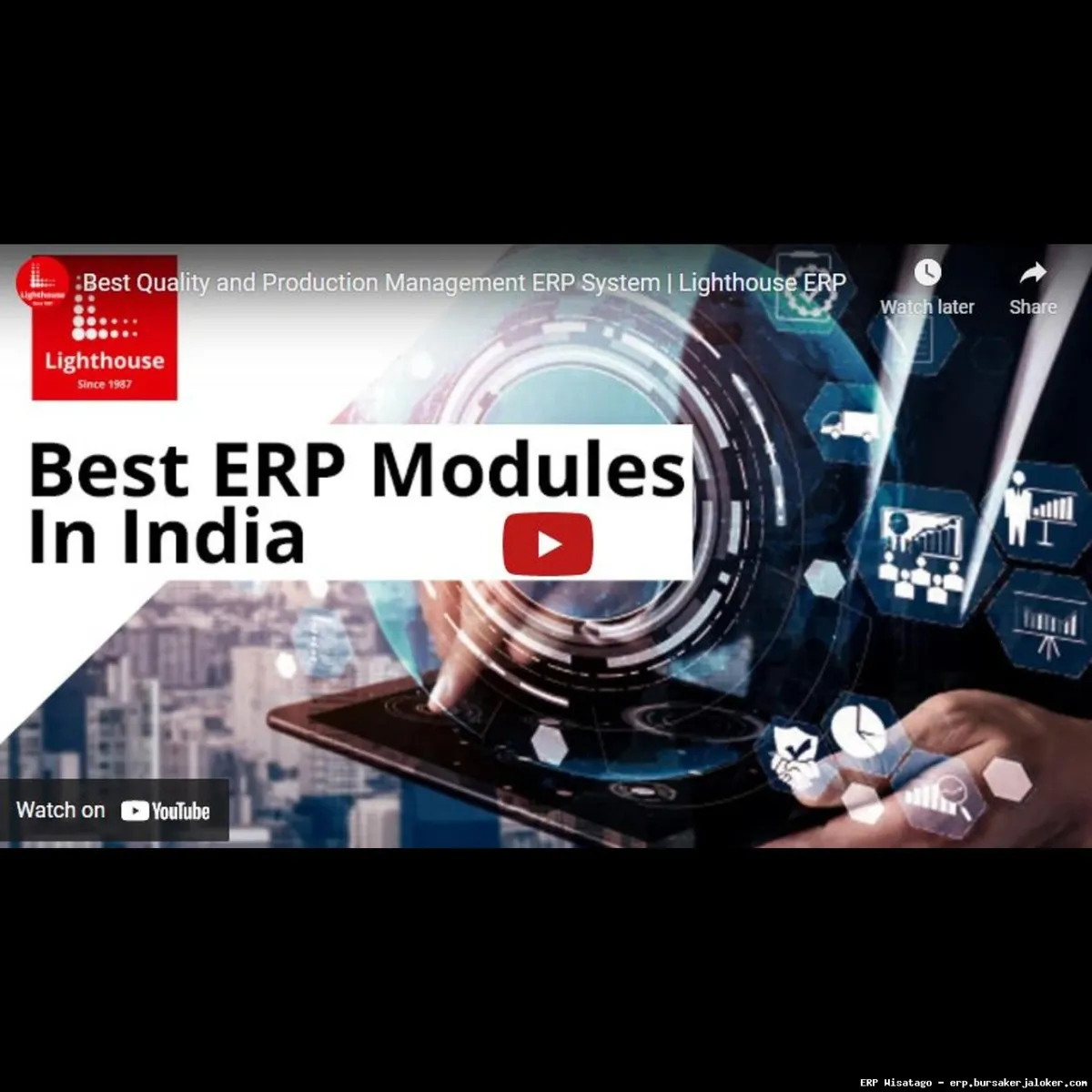In today’s competitive business landscape, sales management is more than just closing deals. It’s about building relationships, understanding customer needs, and optimizing the entire sales process from lead generation to after-sales service. For many businesses, especially those experiencing growth or complexity, managing these aspects effectively becomes a significant challenge. Spreadsheets and disparate software solutions can quickly become unwieldy, leading to data silos, inefficiencies, and missed opportunities. This is where Enterprise Resource Planning (ERP) systems come into play, offering a centralized and integrated solution to streamline sales management and drive business growth.
Think of an ERP system as the central nervous system of your business. It connects all the different departments – sales, marketing, finance, operations, and more – allowing them to share data and collaborate seamlessly. When it comes to sales, an ERP system provides a comprehensive view of customer interactions, sales pipelines, inventory levels, and financial data, empowering sales teams to make informed decisions, personalize their approach, and close deals faster. But implementing an ERP is a significant undertaking, and choosing the right system and approach is critical for success.

This guide will delve into the world of ERP for sales management, exploring its key features, benefits, and implementation considerations. We’ll cover everything from understanding the core functionalities of an ERP sales module to navigating the challenges of adoption and selecting the right solution for your specific business needs. Whether you’re just starting to explore ERP or looking to optimize your existing system, this guide will provide you with the knowledge and insights you need to leverage ERP to transform your sales operations and achieve your business goals. I’ll draw on my experience helping companies like yours implement these systems, sharing practical tips and lessons learned along the way to help you avoid common pitfalls.
What is ERP for Sales Management?
ERP for sales management refers to the integrated module or set of modules within an ERP system that specifically addresses the needs of a sales department. It automates and streamlines various sales processes, providing a centralized platform for managing customer relationships, tracking sales opportunities, and forecasting sales performance. It’s not just about replacing your CRM; it’s about connecting your sales efforts to the rest of your business operations.
Key Components of an ERP Sales Module
A comprehensive ERP sales module typically includes the following key components:
- Customer Relationship Management (CRM): This is the foundation, encompassing contact management, lead tracking, opportunity management, and customer interaction history. It ensures that all customer information is centralized and accessible to the sales team.
- Sales Order Management: This component handles the entire sales order process, from order entry and fulfillment to invoicing and shipping. It integrates with inventory management to ensure accurate stock levels and timely order delivery.
- Sales Forecasting: Leveraging historical data and current sales trends, this component provides accurate sales forecasts to help businesses plan production, manage inventory, and allocate resources effectively.
- Pricing and Discount Management: This allows businesses to define pricing strategies, manage discounts, and ensure consistent pricing across all sales channels.
- Inventory Management Integration: Real-time visibility into inventory levels is crucial for sales teams to accurately promise delivery dates and avoid overselling.
- Reporting and Analytics: Provides insights into sales performance, customer behavior, and market trends, enabling data-driven decision-making.
Benefits of Using ERP for Sales Management
Implementing an ERP system for sales management offers a multitude of benefits, leading to increased efficiency, improved customer satisfaction, and ultimately, higher revenue.
Improved Sales Efficiency
By automating repetitive tasks and streamlining sales processes, ERP systems free up sales teams to focus on building relationships and closing deals. Features like automated lead routing, proposal generation, and order processing significantly reduce administrative burden and improve overall sales efficiency.
Enhanced Customer Relationship Management
A centralized CRM within the ERP system provides a 360-degree view of each customer, enabling sales teams to personalize their interactions and provide exceptional customer service. Access to complete customer history, including past purchases, interactions, and preferences, allows for more targeted and effective communication. For more information, you can refer to RMM as an additional resource.
Better Sales Forecasting and Planning
ERP systems provide accurate sales forecasts based on historical data and current market trends, enabling businesses to plan production, manage inventory, and allocate resources effectively. This leads to reduced inventory costs, improved order fulfillment rates, and increased customer satisfaction.
Increased Revenue and Profitability
By improving sales efficiency, enhancing customer relationships, and optimizing sales forecasting, ERP systems ultimately contribute to increased revenue and profitability. The ability to close deals faster, retain customers longer, and make informed decisions based on accurate data translates directly into bottom-line growth.
Improved Communication and Collaboration
An ERP system breaks down data silos and facilitates seamless communication and collaboration between different departments, such as sales, marketing, finance, and operations. This ensures that everyone is on the same page and working towards the same goals.
Challenges of ERP Implementation for Sales
While the benefits of ERP for sales management are undeniable, implementing an ERP system is not without its challenges. Understanding these challenges and preparing for them is crucial for a successful implementation.

Data Migration and Cleansing
Migrating data from legacy systems to the new ERP system can be a complex and time-consuming process. It’s essential to cleanse and validate the data to ensure accuracy and consistency. Poor data migration can lead to inaccurate reporting, incorrect sales forecasts, and ultimately, a failed implementation. A common mistake is underestimating the time and resources required for this step. We often had to dedicate a significant portion of the project timeline to data cleansing, sometimes even bringing in temporary staff to assist.
User Adoption and Training
Getting sales teams to adopt the new ERP system can be a significant challenge, especially if they are used to working with familiar tools and processes. Comprehensive training and ongoing support are essential to ensure that users understand the benefits of the new system and are comfortable using it. Resistance to change is natural, so it’s important to involve sales representatives in the implementation process and address their concerns proactively. Showing them how the ERP will make their lives easier, not harder, is key.
Integration with Existing Systems
Integrating the ERP system with existing systems, such as e-commerce platforms and marketing automation tools, can be complex and require specialized expertise. It’s essential to carefully plan the integration process and ensure that all systems are compatible. Incomplete or poorly executed integrations can lead to data inconsistencies and workflow disruptions.
Cost and Time Overruns
ERP implementations can be expensive and time-consuming. It’s essential to carefully budget for the project and establish realistic timelines. Scope creep and unexpected challenges can lead to cost and time overruns. A well-defined project plan, clear communication, and proactive risk management are crucial for staying on track.
Choosing the Right ERP System for Sales Management
Selecting the right ERP system for sales management is a critical decision that can significantly impact the success of your business. Here are some key factors to consider when evaluating different ERP solutions:
Identify Your Business Needs
Before you start evaluating ERP systems, it’s essential to clearly define your business needs and requirements. What are your biggest challenges in sales management? What are your goals for the new ERP system? What features are essential for your business? A thorough needs assessment will help you narrow down your options and choose a system that meets your specific requirements.
Consider Industry-Specific Solutions
Some ERP vendors offer industry-specific solutions that are tailored to the unique needs of particular industries. These solutions typically include pre-configured features and functionalities that are relevant to the industry, reducing the need for customization. For example, a manufacturing company will have different needs than a retail company.
Evaluate Scalability and Flexibility
Choose an ERP system that can scale with your business as it grows. The system should be able to handle increasing data volumes, user counts, and transaction volumes. It should also be flexible enough to adapt to changing business needs and integrate with new technologies. Cloud-based ERP solutions often offer greater scalability and flexibility than on-premise solutions.
Assess Vendor Reputation and Support
Choose a reputable ERP vendor with a proven track record of successful implementations and excellent customer support. Read online reviews, talk to other customers, and ask for references. A reliable vendor will provide comprehensive training, ongoing support, and regular updates to ensure that your ERP system is running smoothly.
Consider Cloud vs. On-Premise Deployment
Decide whether you want a cloud-based or on-premise ERP system. Cloud-based ERP systems are hosted by the vendor and accessed over the internet, while on-premise systems are installed on your own servers. Cloud-based solutions typically offer lower upfront costs, greater scalability, and easier maintenance, while on-premise solutions provide greater control over data and security. The choice depends on your budget, IT infrastructure, and security requirements.

Key Features to Look for in an ERP Sales Module
When evaluating ERP systems for sales management, pay close attention to the specific features offered within the sales module. Here are some key features to look for:
- Lead Management: Comprehensive lead tracking, scoring, and routing capabilities.
- Opportunity Management: Tools for managing sales opportunities, tracking progress, and forecasting revenue.
- Quotation Management: Automated quote generation and management, with flexible pricing and discount options.
- Order Management: Streamlined order entry, processing, and fulfillment.
- Inventory Management Integration: Real-time visibility into inventory levels and automated stock replenishment.
- Sales Reporting and Analytics: Customizable reports and dashboards for tracking sales performance and identifying trends.
- Mobile Access: Mobile apps that allow sales teams to access customer information, update opportunities, and place orders from anywhere.
- Integration with CRM: Seamless integration with CRM functionalities for a complete view of customer interactions.
Conclusion
ERP for sales management offers a powerful solution for businesses looking to streamline their sales processes, improve customer relationships, and drive revenue growth. By centralizing data, automating tasks, and providing real-time insights, ERP systems empower sales teams to work more efficiently, make informed decisions, and close deals faster. While implementing an ERP system can be challenging, the benefits far outweigh the costs for businesses that are committed to improving their sales performance. Remember to carefully assess your business needs, choose the right ERP solution, and invest in comprehensive training and support to ensure a successful implementation. The right ERP is an investment in the future of your sales organization and your overall business success.
Frequently Asked Questions (FAQ) about ERP for sales management
What are the key benefits of implementing an ERP system specifically for managing sales processes, and how does it improve sales team efficiency?
Implementing an ERP system for sales management offers several key benefits. Firstly, it provides centralized data management, integrating sales data with other business functions like inventory, finance, and customer relationship management. This eliminates data silos and provides a single source of truth for accurate reporting and informed decision-making. Secondly, ERP systems automate sales processes such as order entry, quoting, and invoicing, reducing manual errors and freeing up sales representatives to focus on building relationships and closing deals. This automation streamlines workflows, leading to faster turnaround times and improved customer satisfaction. Thirdly, ERP systems offer real-time visibility into sales performance, allowing managers to track key metrics, identify trends, and make data-driven adjustments to sales strategies. Finally, ERP systems often include mobile capabilities, enabling sales teams to access critical information and perform tasks on the go, further enhancing their efficiency and responsiveness.
How does an ERP system help with sales forecasting and pipeline management, and what features should I look for when choosing an ERP for these tasks?
An ERP system significantly enhances sales forecasting and pipeline management by providing a centralized platform for tracking sales opportunities from lead generation to closure. It leverages historical data, current market trends, and sales team input to generate more accurate sales forecasts. Features to look for include customizable dashboards that display key performance indicators (KPIs) such as win rates, average deal size, and sales cycle length. The system should also offer pipeline visualization tools that allow sales managers to easily identify bottlenecks and potential issues in the sales process. Lead scoring and qualification features are also crucial for prioritizing leads and focusing sales efforts on the most promising opportunities. Furthermore, the ERP system should integrate with CRM functionalities to ensure a seamless flow of information between marketing and sales teams. Finally, reporting and analytics capabilities are essential for analyzing forecast accuracy and identifying areas for improvement.
What are some common challenges faced during ERP implementation for sales management, and how can businesses overcome these challenges to ensure a successful rollout?
Implementing an ERP system for sales management can present several challenges. One common issue is resistance to change from sales teams who may be accustomed to existing processes. Overcoming this requires clear communication, thorough training, and demonstrating the benefits of the new system. Another challenge is data migration; transferring data from legacy systems can be complex and time-consuming. Careful planning, data cleansing, and validation are essential. Ensuring proper integration with other business systems is also crucial. This requires a well-defined integration strategy and potentially custom development work. Inadequate project management can also derail implementation. A dedicated project manager, a well-defined project plan, and regular progress monitoring are essential for staying on track. Finally, insufficient training can lead to low user adoption. Comprehensive training programs tailored to different user roles are vital for ensuring that sales teams can effectively use the new system. Address these challenges proactively to ensure a smooth and successful ERP rollout.
